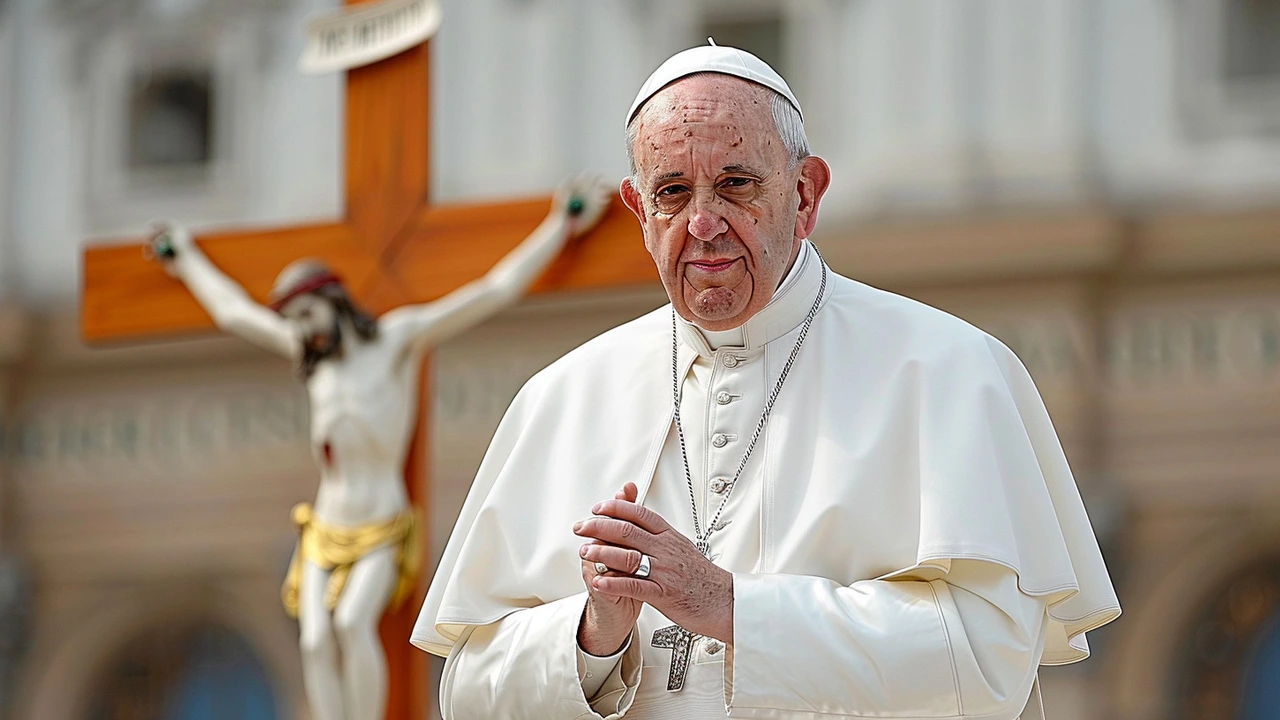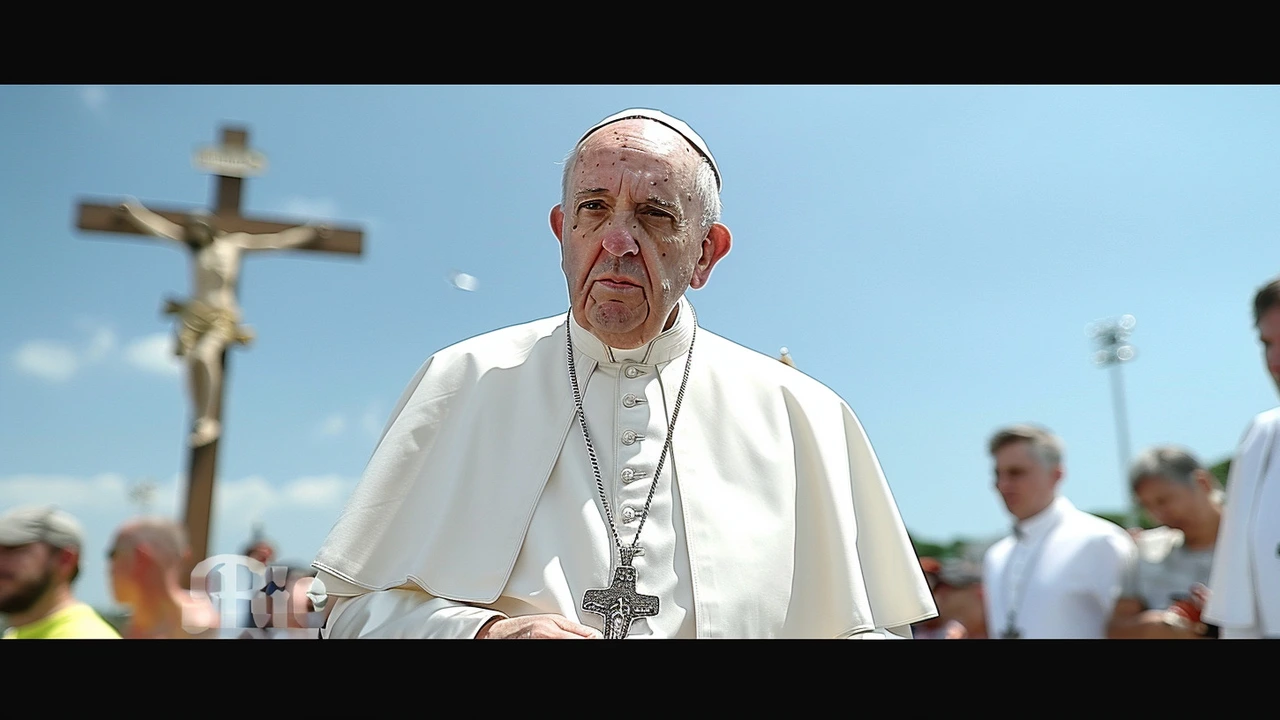 Jun, 13 2024
Jun, 13 2024
Pope Francis to Make Historic Appearance at G7 Summit to Address Ethical AI Concerns
Pope Francis will make history as he becomes the first pontiff to participate in the Group of 7 (G7) summit, an event traditionally dominated by political leaders and economic powerhouses. This momentous occasion is set to take place in the picturesque location of Borgo Egnazia in Italy, a setting befitting the gravity of the discussions to unfold. The Pope's involvement signifies a growing recognition of the moral and ethical dimensions to global challenges, particularly as they pertain to technological advancements such as artificial intelligence (AI).
Artificial Intelligence and Moral Considerations
The Pope's agenda at the summit includes dialogues on artificial intelligence, a subject he has repeatedly addressed with caution and concern. Pope Francis has labeled AI's 'perverse' dangers as a significant ethical issue of our time. His statements often delve into the moral responsibilities associated with AI's development and deployment, urging for a framework that prioritizes human dignity and the common good. He argues that without proper ethical guidelines, AI could exacerbate inequalities and infringe upon fundamental human rights. By bringing this discussion into the G7 summit, Pope Francis aims to influence policymakers and tech giants to consider the human implications of their innovations.
Bilateral Meetings with Prominent World Leaders
During his one-day visit to the summit, Pope Francis will engage in one-on-one discussions with several influential leaders. Among those slated for private meetings is U.S. President Joe Biden. As a fellow Catholic, Biden's meeting with the Pope is highly anticipated, likely to cover a range of topics beyond AI, including issues of social justice and humanitarian aid. The bilateral agenda also includes talks with Ukrainian President Volodymyr Zelenskiy amidst the ongoing conflict in Ukraine, and French President Emmanuel Macron, where discussions may pivot around European stability and migration concerns.
Global Diversity in Engagements
Pope Francis's meetings are not limited to Western leaders. He will also meet Indian Prime Minister Narendra Modi, where dialogues may encompass interfaith relations and environmental sustainability. Brazilian President Luiz Inacio Lula da Silva’s meeting is expected to spotlight the Amazon rainforest and indigenous rights, reflecting the Pope's advocacy for ecological preservation. Canadian Prime Minister Justin Trudeau's discussion may highlight indigenous reconciliation and climate change. Further, encounters with Turkey's President Recep Tayyip Erdogan and Kenya's President William Ruto are anticipated to touch on regional security issues and economic cooperation.
Engagement with Financial and Institutional Leaders
Aside from state leaders, Pope Francis will have discussions with notable figures like Kristalina Georgieva, head of the International Monetary Fund (IMF). This engagement is poised to examine the intersections of economic policies and social equity, stressing the Pope's perspective on prioritizing those who are most impoverished in global financial reforms. He will also confer with Algeria's President Abdelmadjid Tebboune, hinting at possible conversations on North African socio-economic dynamics and European-African relations.

Significance of Papal Presence at G7
Pope Francis's participation in the G7 summit signifies a groundbreaking departure from the norm, underscoring the intertwining of ethical discourse with geopolitical strategy. By placing ethical concerns at the forefront of discussions on artificial intelligence, the Pope aims to steer the narrative towards a more humane and just application of technology. His presence is a call to the world's most powerful nations to heed not only economic and strategic considerations but also the moral and ethical implications that their decisions have on humanity and the planet.
As Pope Francis prepares to meet with these global leaders, the international community watches closely, recognizing that his influence could catalyze a shift towards policies that integrate ethical considerations at their core. The spiritual leader's historic involvement in this political arena marks a pivotal moment, heralding a future where moral accountability takes a seat at the table of global power and decision-making.

Debbie Billingsley
June 13, 2024 AT 19:41The Pope's presence at the G7 is a diversion from the United States' decisive role in shaping AI ethics. America must lead the conversation, not rely on a European religious figure to dictate policy.
Patrick Van den Berghe
June 21, 2024 AT 17:32I see the Vatican trying to insert itself into tech policy but the truth is AI affects everyone everywhere and borders are meaningless when data flows across them.
Josephine Gardiner
June 29, 2024 AT 15:22It is noteworthy that the Holy See elects to address the moral ramifications of artificial intelligence within a forum traditionally dominated by secular governance. Such an initiative underscores the intersection of ethical philosophy with contemporary technological advancement, inviting a broader discourse that transcends mere economic considerations.
Jordan Fields
July 7, 2024 AT 13:13The Pope should focus on moral guidance.
Divyaa Patel
July 15, 2024 AT 11:03Listen, the digital age has birthed a new kind of Prometheus, a silicon titan that promises miracles and threatens to unshackle chaos. When the Pontiff steps onto this stage, it is not merely a ceremonial gesture but a thunderclap echoing through the marble halls of power. He wields the ancient sword of conscience against the unchecked leviathan of algorithms. The world watches as centuries‑old doctrine grapples with neon‑lit futures, and the stakes? Nothing less than the soul of humanity. In the theater of global summits, his voice becomes a lantern in the fog of data, a beacon for those who fear the abyss of dehumanization. Yet, we must ask: will this lantern illuminate the path or merely cast longer shadows? The moral compass he offers is a compass that must be calibrated against the latitude of innovation. If tech giants ignore the papal plea, the consequence could be a digital dystopia where profit eclipses personhood. Conversely, his engagement could spark a renaissance of values‑driven design, where code respects dignity. The dialogue is a delicate ballet, pirouetting between faith and function, belief and binary. Let us hope that this dance does not stumble into a cacophony of empty rhetoric, but instead harmonizes the sacred with the synthetic. In every pixel of this discourse lies the potential to rewrite the narrative of progress, steering it toward a horizon where humanity remains at the helm.
Larry Keaton
July 23, 2024 AT 08:54Yo Larry here! Gotta say the Pope talking AI is kinda rad but we need real talk – tech wizards gotta step up and not just push code for cash. Gotta keep it real for the onrs who ain’t got a voice.
Liliana Carranza
July 31, 2024 AT 06:45Hey folks! Let’s rally behind this moment and push for tech that lifts everyone up! The Pope’s voice can spark a wave of compassion in AI – imagine a world where algorithms truly care.
Jeff Byrd
August 8, 2024 AT 04:35Oh great, the Pope’s dropping by the G7 – maybe he’ll bless the Wi‑Fi while he’s at it. #sarcasm
Joel Watson
August 16, 2024 AT 02:26One must appreciate the subtle gravitas that a pontifical presence adds to a geopolitical symposium, yet one should remain wary of conflating theological counsel with the rigor of policy engineering.
Chirag P
August 24, 2024 AT 00:16Respectfully, the inclusion of ethical perspectives is essential, and it is encouraging to see leaders from varied backgrounds engage with AI governance.
RUBEN INGA NUÑEZ
August 31, 2024 AT 22:07Listen up – the conversation needs muscle. The Pope’s moral messages are important, but we must demand concrete frameworks now, not later.
Michelle Warren
September 8, 2024 AT 19:41Ok so like the Pope showing up is kinda overblown but honestly AI ethics is sloooow and we need more than just symbolic gestures – get real already.